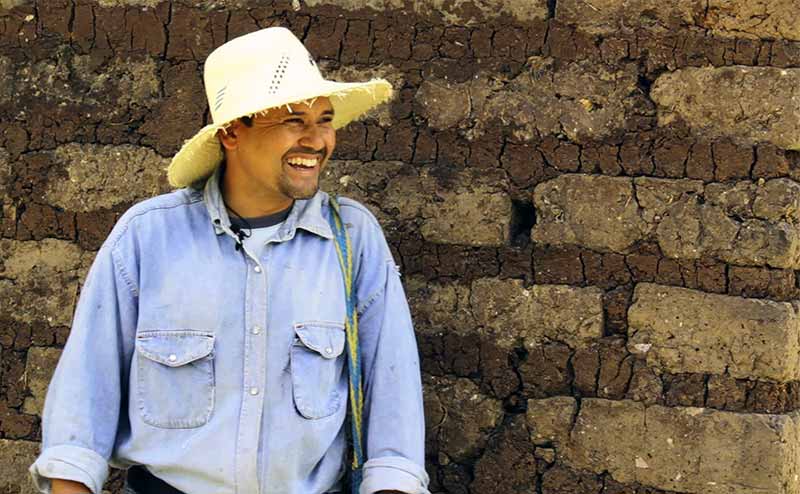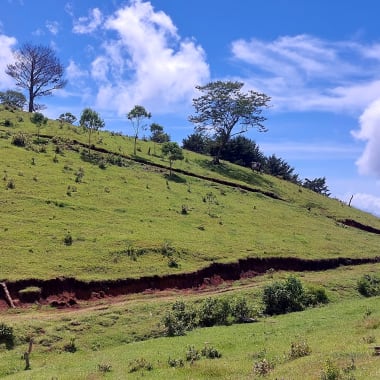-
Producer
-
Juan Carlos Manueles
-
Country
- Honduras
-
Region
-
Santa Elena, La Paz
-
Altitude
-
1800m above sea level
-
Variety
-
Process
-
Harvested
-
December 2015
-
Body
-
Medium
-
Acidity
-
Vibrant
-
Tasting notes
-
Melon, pink grapefruit, orange peel
-
Roast style
Honduras
Yire
Juan Carlos Manueles Ventura’s farm is located in La Paz, one of the highest and coldest parts of the Honduras, near to the border with El Salvador.
For Juan Carlos, his wife and two children, the farm represents their livelihood. It also contributes to the economy of the community employing 12 to 15 neighbouring families to help with maintenance, picking, hauling and processing of coffee.
Thanks to coffee, Juan Carlos is able to send his son to study agronomy, continuing the family tradition.

Award-winning quality
Juan Carlos’s focus on quality has seen his farm twice awarded in the Honduras Cup of Excellence awards, which recognises coffees which score 85 points and above out of 100 in tastings by both a national and international jury. His harvest of Pache (the varietal we’re sharing with you) placed 27th in 2015. In 2016 his crop placed 21st in a much smaller field, and earned a 120% premium on the auction price from the previous year’s crop.
Meet Pache
This coffee is a relatively unusual varietal called Pache. It’s a dwarf mutation of the typica varietal, which we’ve previously only featured alongside Catuai and Cattura in the Guatemala La Idolia.
Processing
Juan Carlos is dedicated to taking care at every stage of the production process.
Coffee is fermented for 36 hours before being washed with clean water from a local spring. It’s first dried on open-air screens (you can see one behind Juan Carlos in the top photo) before being moved to the raised beds, under cover, aiming for slow drying of 17–20 days to completion.
Juan Carlos says that caring for his farm means keeping it free from weeds, performing a selective picking and leaving in the trees the green beans and using only the mature.
In Honduras, 92% of coffee production comes from small producers, such as Juan Carlos, who traditionally have picked and de-pulped their own coffee and then sold wet parchment to Coyotes, who buy from the farm gate in exchange for cash. This is the quickest way for a producer to receive money for their crop. This coffee then goes to large-scale mills to be exported as commercial grade bulk lots.
However, Juan Carlos and the other small producers we work with are part of a new movement of farmers who are processing and drying their own coffee.
This new group of producers is pursuing quality and together they are aiming to increase the volume of ‘Specialty Grade’ coffee exported from the country, which currently sits at just one percent. These farmers are being encouraged to invest in taking care of their washing tanks and de-pulping equipment, and building their own raised drying beds, all of which continue to improve quality.
We’re really excited to be a part of this new era of coffee production in Honduras, and to share the coffee and stories of these small farmers and their families with you.
Learn everything about this coffee:
Ethical, traceable sourcing
This page has all the sourcing information (variety, process, region, story, importer, and more) that our importers share with us, and give us permission to use.
The transparency helps us talk confidently about the quality and background of our product, and it helps you know exactly what you’re buying.
Learn more:
Coffee page transparency legend
Our coffee philosophy
Our business approach
Fresh harvest coffee
We only source and roast coffee from each country’s latest harvest season (so the green coffee is never older than 1 year from the time of picking, processing and packing). This ensures the sensory qualities are always at their peak and unaffected by excessive ageing.
Roasted for espresso and filter (best enjoyed black)
Roast style: omni. Omni roasts are designed to brew and taste great both as espresso and filter. Our omni single origins generally sit on Agtron values in the ~70-60 value range. So, technically, they are somewhere in the lighter side of the medium spectrum.
Designed for espresso and filter brewing. Best enjoyed black.
Learn more:
Our Loring Kestrel S35 roaster
Our roasting style and approach
Best brewed within days 15-49 post-roast
The ‘fresh is best’ saying doesn’t apply to coffee (contrary to popular belief). Waiting before opening and brewing your bag of whole coffee beans helps develop peak flavour and acidity.
But heads up: if you buy pre-ground coffee, brew it as soon as possible.
Learn more:
Our recommended brewing window
Try our custom brewing recipes
Our recipes and ratios are tailored to our coffee sourcing and roasting styles, bringing the best flavour and feel out of each coffee.
For pour over, immersion, and other filter brewing styles, check our brew guides.
For our espresso single origins, we recommend a coffee:yield ratio of 1:3:
- Dose: 20g ground coffee
- Yield: 60g espresso
- Total brew time: ~24-28 seconds
This is just a starting point! We encourage you to experiment, taste, and adjust to find the recipe that you enjoy the most.
Learn more:
Our espresso brew guide (single origin)
Brewing ratio calculator
Packaging and sustainability
- Bags: ABA-certified home compostable (AS 5810-2010)
- Labels: recyclable
- Valves (only on +250g bags): general waste
- Box and tape (online orders): recyclable
Learn more:
Our packaging
Variety
Pache variety
Pache is a natural mutation of Typica, originally discovered in Guatemala in farms of El Brito, Santa Cruz Naranjo and Santa Rosa.
The location
Coffee from Honduras
The largest producer of coffee in Central America and one of our favourite coffee producing nations, capable of producing fruit driven coffees with a great, vibrant acidity.
Farm processes
Washed process
Machines are used to remove the flesh from the coffee cherry before being fermented in water, washed again, and finally sun dried. This process tends to result in more distinct, cleaner flavours.
1 brew note from subscribers
Honduras Yire
Simon’s Chemex
Sample Coffee Team
- 40g
- 640ml

Subscribe to a world of coffee
Discover a new single origin coffee from Sample every 1-5 weeks with no delivery fees.
No up-front purchase, and you can pause, cancel, or change plans at any time.
Available to order online this week:

Kenya Karimikui
Flavours of blood orange, blackberry, plum jam
Body Acidity
Washed Batian, SL28, SL34, Ruiru 11
November 2024 harvest
Roasted omni for filter and espresso
Kenya Karimikui online
El Salvador Manuel Castañeda
Flavours of toffee apple, cranberry, dulce de leche
Body Acidity
Honey Pacamara
March 2025 harvest
Roasted omni for filter and espresso
El Salvador Manuel Castañeda online
Peru Miguel Estela
Flavours of honeydew melon, white grape, marmalade
Body Acidity
Washed Marshell
August 2025 harvest
Roasted omni for filter and espresso
Peru Miguel Estela online
Ethiopia Tadese Teko
Flavours of bergamot, mandarin, mango
Body Acidity
Washed Ethiopian Heirloom
January 2025 harvest
Roasted omni for filter and espresso
Ethiopia Tadese Teko online